How the Bloody Feuds of ‘Jaws’ Became ‘The Shark Is Broken’ on Broadway
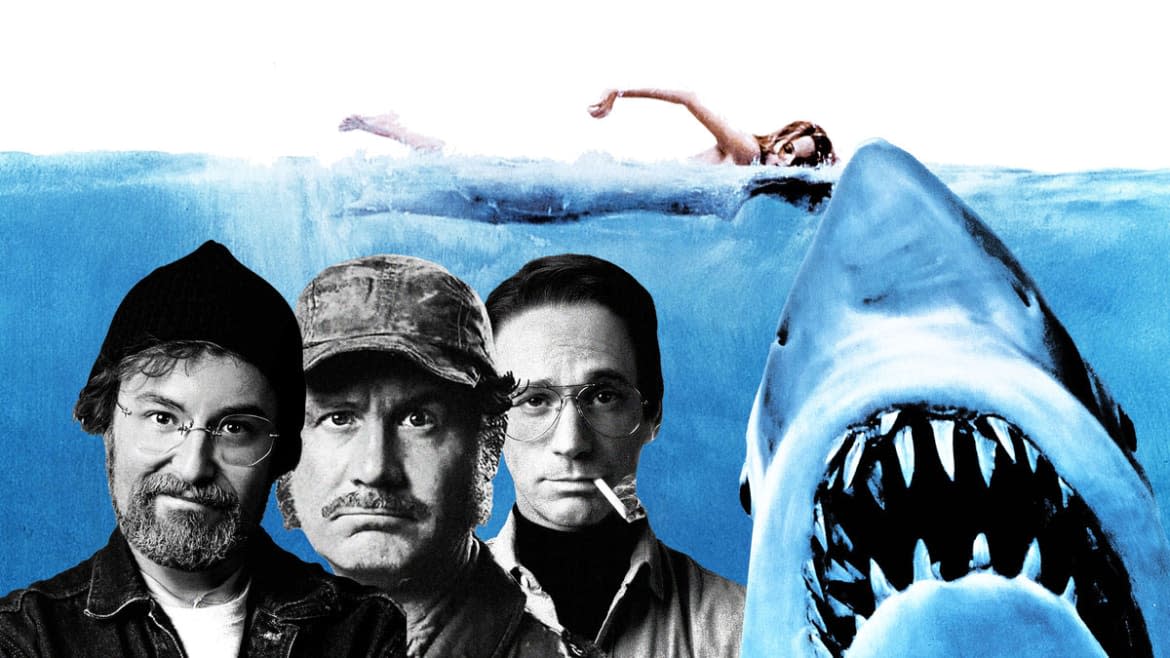
- Oops!Something went wrong.Please try again later.
- Oops!Something went wrong.Please try again later.
- Oops!Something went wrong.Please try again later.
- Oops!Something went wrong.Please try again later.
- Oops!Something went wrong.Please try again later.
Ian Shaw recalls seeing Jaws for the first time aged 7, around a year before the death of his father, the actor Robert Shaw, who played the bug-eyed, shark-hunting Quint in the legendary 1975 movie.
“I cried out at night because I thought sharks were swimming around my bed, and he came to give me a cuddle,” Shaw recalled to The Daily Beast, sitting in the upstairs bar of Broadway’s Golden Theatre, where the award-nominated play he has co-written, The Shark Is Broken, is presently playing (booking to Nov. 19). The 90-minute (mostly) comedy relates the backstage dramas and delays around the making of the movie, and specifically the sniping, fighting, and communing between its three lead actors—Roy Scheider (Chief Brody), Richard Dreyfuss (Matt Hooper), and Shaw—as repairs to the mechanical shark, nicknamed Bruce (after director Steven Spielberg’s lawyer Bruce Ramer), are being carried out.
My Time on the Set of ‘Jaws,’ or How to Get a Photo of a Frickin’ Mechanical Shark
Shaw not only conceived and co-wrote the story; he plays his own father—and looks joltingly like him. Two-time Tony-nominated Alex Brightman (of Beetlejuice and School of Rock fame), who plays Dreyfuss, and Colin Donnell (Irreverent, The Affair, Arrow), who plays Scheider, are sitting with Shaw, and looking astonished at hearing the story of him as a terrified little boy for the first time.
“Can you imagine having a Jaws-fueled shark-related dream and being woken up and comforted by Quint? To me, that’s an amazing visual,” Brightman exclaimed.
All three men roared with laughter.
“We were staying in Beverly Hills at the time, and we were staying next to Jimmy Stewart,” Shaw continued. “I know that because I kicked my ball over the fence. I went out and around…”
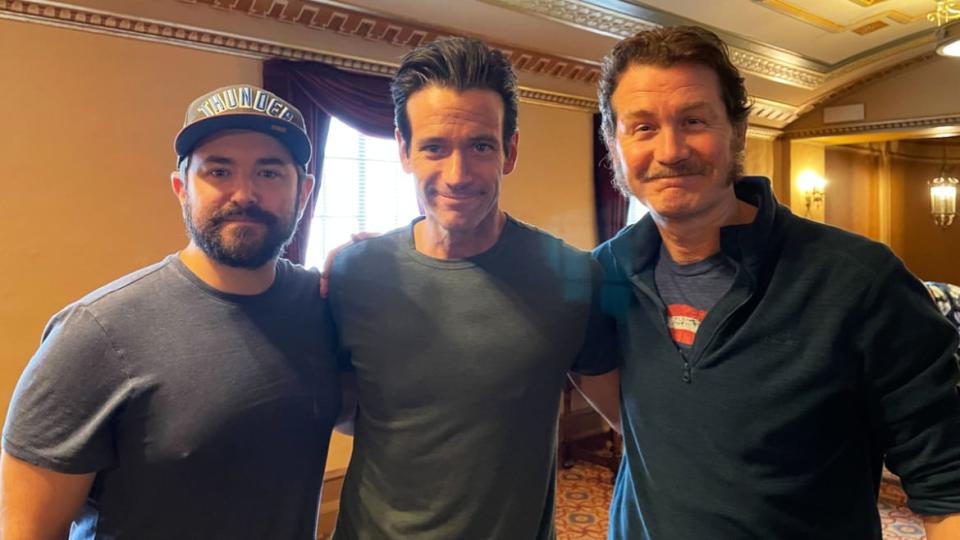
(Left to right) Alex Brightman, Colin Donnell, and Ian Shaw, stars of 'The Shark Is Broken,' which Shaw, son of "Jaws" star Robert Shaw, co-wrote.
Donnell and Brightman stared at Shaw agog.
“Whose is this ball?” Donnell said, doing a very good Stewart impersonation.
“And I knocked on Jimmy Stewart’s door and Jimmy Stewart opened the door to me. I had no idea who this old man was,” said Shaw.
“No fucking way,” Brightman said.
“This is a true story,” Shaw said, then paused. “I don’t know what it is, but I always distinguished very clearly between Robert and Quint. So when we watch the film, some of my siblings say they’re not so scared when Quint gets eaten because they know it’s Robert. I’m like, ‘No.’ I get scared, as much as Quint caused his own death I believe him to be Quint. When my dad was at home I didn’t see them as the same people.”
On stage, the forces and characters of the bellicose Quint and bellowing Shaw do not seem hugely different.
“Robert was very, very different to Quint,” Shaw insisted. “When I was a child, Robert was very funny and affectionate. Maybe that says something about my brain that I separate those things—make-believe and reality.” He paused, smiled, and added drily. “That’s quite an important distinction, isn’t it?”
Another eruption of collective laughter.
“It’s sort of an Oedipal thing”
In the play—which was first performed in Brighton in the U.K. in 2019, then the Edinburgh Festival Fringe, then London’s West End, then Toronto—we watch Robert Shaw, Dreyfuss, and Scheider as they try to kill time, and not each other, on the hull of the Orca. A sizable chunk of the boat has been mischievously hollowed or bitten out of the craft on Duncan Henderson’s set so we can see the men as they will “Bruce” to a speedy recovery, so they can complete filming.
Dreyfuss and Shaw’s relationship is particularly tempestuous, with Shaw’s all-consuming alcoholism and disdain for his younger costar combusting towards displays of vicious invective and physical aggression. Scheider is the peacemaker, until a delicious solo scene where we see another side of Mr. Responsible, Donnell dressed only in a tiny black Speedo basking in the sunshine during yet another filming delay. (Prediction: The Speedo scene will be much, umm, discussed.)
The through-theme of the play is Shaw’s struggle and eventual mastery of Quint’s USS Indianapolis speech, where, late at night under the swaying light of the Orca, Quint recalls some of the ship’s crewmen being eaten alive by sharks when the boat sank in 1945—having “just delivered the bomb, the Hiroshima Bomb”—after being torpedoed by the Japanese.
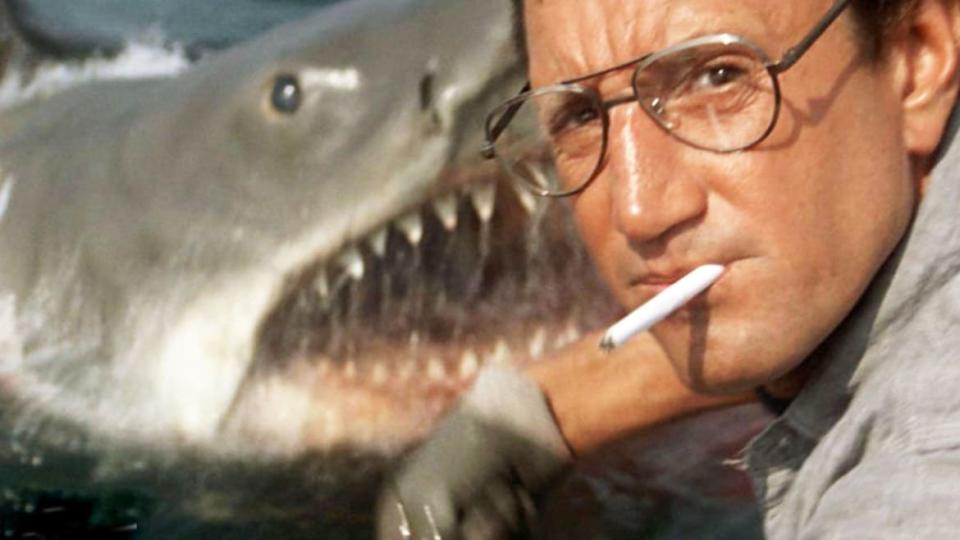
"Jaws," 1975.
“First of all, I adore that speech,” said Shaw. “Also, in 1974 when Jaws was filmed, there is no way the men were not watching on the news all the senseless bloodshed in Vietnam.” As well as the cinematic power of it, the speech was also heavily edited, then rewritten by Robert Shaw, who was—in one take—too drunk to perform it. “There were so many interesting threads to it, it had to be the spine of the play,” said Ian Shaw.
Jaws fans will relish the many Easter eggs written into the script—very famous lines from the film, references, design elements (the swinging light on the boat!), music, and all the true-to-life tidbits that Shaw and co-writer Joseph Nixon have excavated from Jaws co-screenwriter Carl Gottlieb’s book, The Jaws Log, as well as a number of documentaries, interviews with Spielberg, Dreyfuss, and Scheider, and Robert Shaw’s drinking diaries. “It’s become the stuff of movie legend, I suppose,” said Shaw.
The men bitch not only about their present circumstances—What is this film? Will it be a success? Will it tank? What about our careers?—but also acting and fame more generally. They do not know what a huge success Jaws will become.
“I think any actor who has been in enough workshops or something starting out, especially in theater, knows what it’s like,” Brightman told The Daily Beast. “You may think the thing is good, but as a human you know, ‘I’m in this thing. Is it actually any good?’ I resonate with that Dreyfuss-ism. I may think it’s good, but that’s not enough. As an actor you need feedback. As an actor, you can only enjoy something if everyone else is enjoying it. You think, ‘If everyone else thinks it’s good, then maybe I’m OK in it.’ I completely resonate with a lot of Dreyfuss’ anxieties as an actor and as a human. A lot of actors feel that way—full of dread and anxiety. ‘Am I doing a good job?’—not just on sets, but genuinely, nightly, here. We all come off stage and have a little assessment after the show. We’re the only job that does this continual diagnostic check on ourselves.”
How meta to be three actors—one of whom is playing their father in one of the most iconic movies of all time—playing three actors interrogating the process of acting.
“Incredibly so,” said Brightman. “You hope anything you are in is a hit. Sometimes that hope leads into delusion. For the most part, if the actor ever knows they are not in something incredible they find some way to know they are in the right place.”
He paused, and looked at Shaw and Donnell. “This is not a reflection of this show by the way.” The three men laughed. “This is completely outside of what we’re doing. I am in the right place in this show, 100 percent!”
Had the movie not been delayed by the myriad problems with “Bruce,” Shaw suspects the feuding and animosity between his father and Dreyfuss wouldn’t have been as bad as it became. “I don’t think it was just the delays. There were several factors—being cooped up in a very difficult environment on the water. There are extraordinary pictures of the crew doing kind of acrobatics to do their job. There were people being seasick. And Richard wound Robert up.”
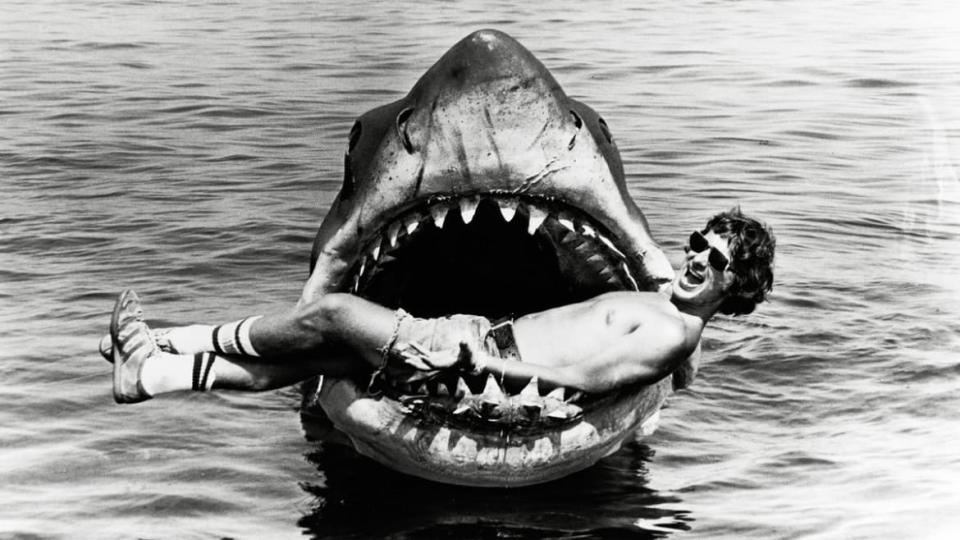
Director Steven Spielberg, "Jaws" 1975.
“It was also a time when people freely drank on set,” said Brightman. “For actors to really go for it between takes was expected. Now it’s really shameful. Then, if you didn’t do any of that stuff, you were considered weird.”
The macho drinking culture of actors was a particularly British thing, said Shaw, especially for the working class actors who rose to fame in the 1960’s, as “an assertion of their masculinity. I think Shaw also bought into that, although his father was a doctor. That may have been part of the reason too.”
The most meta experience is obviously Shaw’s, having co-written the play, and taking on the role of his own father.
Shaw said he found the play an “interesting idea,” though insists he didn’t want to do it, and was convinced to do so by his wife and dear friend—and the show’s original producer—David Mounfield (who died in 2020), as well as co-writer Nixon and set and costume designer Duncan Henderson.
Shaw recalled, “I mentioned it to Dave first over a pint, and he was like ‘This is great idea.’ I was expecting him to say, ‘That’s a stupid idea.’ I kind of wanted him to say that, and was disappointed. Then everyone else started to say it was a good idea. I had spent so long trying not to associate with my father, because you try and make your own path. It’s sort of an Oedipal thing. The natural instinct of the son is to try and run away from the father. Normally that works. You forge your own identity. But when you have a very famous father who is still a significant figure, who people still talk about and revere, it’s to some degree psychologically a little bit harder to get completely beyond the father, or whatever the hell these things are. It was interesting meeting actors who auditioned for this who weren’t as good as our two…”
All three men laughed. “Who were they? Name them!” exclaimed Brightman theatrically.
“The one thing those actors shared with me was that they had famous parents,” said Shaw. “They shook my hand quite firmly on departure, and wished me luck because they did understand that reversing the trajectory, and running towards the father, taking the father on, and running into the jaws of the father—no pun intended, well sort of intended—is peculiarly liberating because you’re facing up to the whole thing then and it gets quite complicated.
“I am quite happy in my life, but I do feel to some degree there is no burden left in that respect, having written it and particularly performing it. Because I feel that my father and I are holding hands, I feel that we are equals. Of course, my career isn’t the same as his. But having gone through this process I feel that a strange bit of poetry occurs when you’re playing your father with love—that there becomes a sort of affectionate dialogue between the two of you. I know it’s in my head. I’m not crazy. It’s been a stressful process, but when the show is up and running and we finish tinkering, I find it a beautiful thing, weirdly.”
Had Shaw found out anything new about his father in the research?
“When I was writing, I became more impressed with him,” Shaw said. “I was very impressed by his candor. He always spoke from the heart. He wasn’t trying to win any friends. I was very impressed by his fearlessness in that respect, and moved by the flaws. I was not so impressed by the aggression of course. But you can understand how sometimes certain personalities do have that quality. He wouldn’t have wanted me to portray him untruthfully.”
Shaw’s alcoholism is portrayed with both dark humor—the concealment, then revealing of multiple hiding places for bottles on the boat—and also seriousness, as his behavior becomes more extreme.
In the play, Robert Shaw recalls his own father’s suicide. As a boy, he and his family moved from the Orkney Islands off the far north coast of Scotland to Cornwall, on the very tip of southwest England, where the author of this article grew up. (After Jaws came out, Shaw’s onetime residency in our quiet and bucolic county was legendary.) “It was a very formative time, because he left the Orkneys after his dad died, and the family resettled in Cornwall,” Ian Shaw said. “I am piecing things together a bit, but I think they were trying to escape the sense of shame that surrounded the death of his father. After Cornwall, they moved to Ireland. I suspect his mother loved the wild nature of both places.”
“Primarily the play is a comedy,” said Shaw. “But like Jaws there’s a lot of comedy that relaxes the audience, and then you try to hit them emotionally. As actors you’re always looking for the pivot point, and trying to capture as much of the human emotional spectrum as possible—tragedy and comedy go hand in hand in that way.”
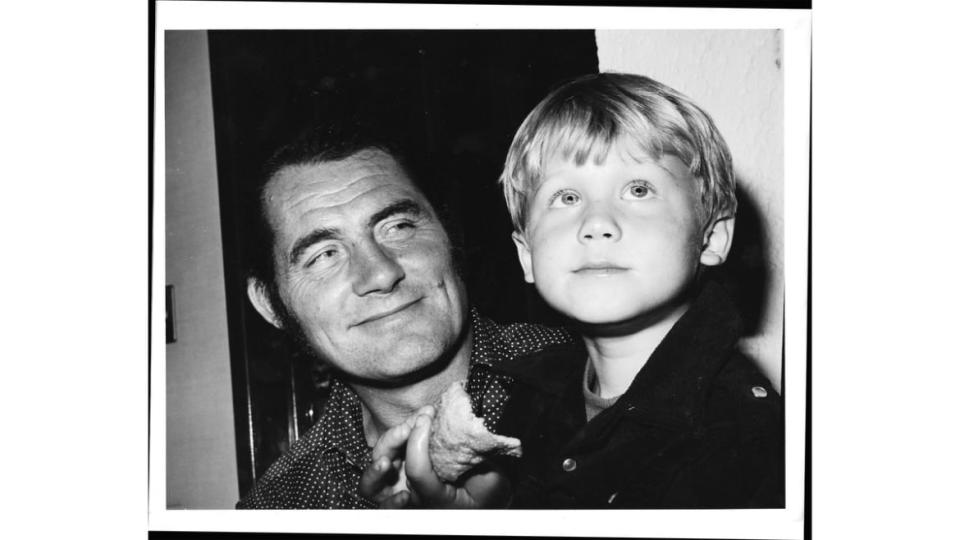
Robert Shaw, left, and his son, Ian Shaw.
Shaw can shrug his father on and off before and after the performance. “It’s quite quick to get in there, and quite quick to get out. It’s fun to be fearless. For an hour and a half it’s fun to play and do make-believe. I am old enough to have done this (acting) for a while. I’m not a method actor. I take half an hour to get myself into character and less time to get out of it. When the audience starts applauding, I’m stood there as Ian Shaw.”
Turning to Donnell and Brightman, Shaw said, “I’d like to compliment these two. In the rehearsal process, there was a lot of heartfelt debate and stressing about the nature of what I was doing, as Robert’s son, and wearing the writer’s hat too. And the patience you guys showed was fucking legendary. It was.”
“Worth every minute,” Brightman said quietly. Donnell assented, adding, “I think there is an expectation to try and make this the best thing it can possibly be for Ian, not only for ourselves as a company and audience.” From the very first day of rehearsal, he and Brightman said, their and their understudies’ views and input were sought, and they were given the freedom to craft and mold elements of their characters. “That was all I needed to know this would be good process,” Brightman said.
“I’m trying to live up to Richard Dreyfuss then”
Shaw and Dreyfuss’ relationship is electrically, crazily all over the place in the play. We see Shaw brutalize Dreyfuss, while Dreyfuss soaks up the punishment. He looks up to Shaw as an experienced, well-connected actor, is also worried for him when he sees his debilitating dependence on alcohol, and then pushes back against some of his aggression.
“It’s a very small, temporary father-son relationship, but it’s real,” Brightman told The Daily Beast. “For Dreyfuss, you love the person, admire them, look up to them, get angry and upset with them, be ashamed of them and shamed for them. But I think the human need in everybody, if you’re not a sociopath, is to help—to try and do something, and, as the son, be punched and choked, even as you try and help your father.”
Brightman really does get tossed around during the show. “I’m mainly throwing myself around, mainly it’s me hurting myself,” said Brightman, smiling. “I’ve made an odd name for myself in the last 10 years doing very physical shows. It wasn’t a conscious choice to beat the shit out of myself for every show I do. I thought this was going to be different. When I heard it was a play, I thought, ‘Great, nobody gets hurt in plays.’ What has ended up happening is that I am doing exactly the same amount of physicality—just without music.”
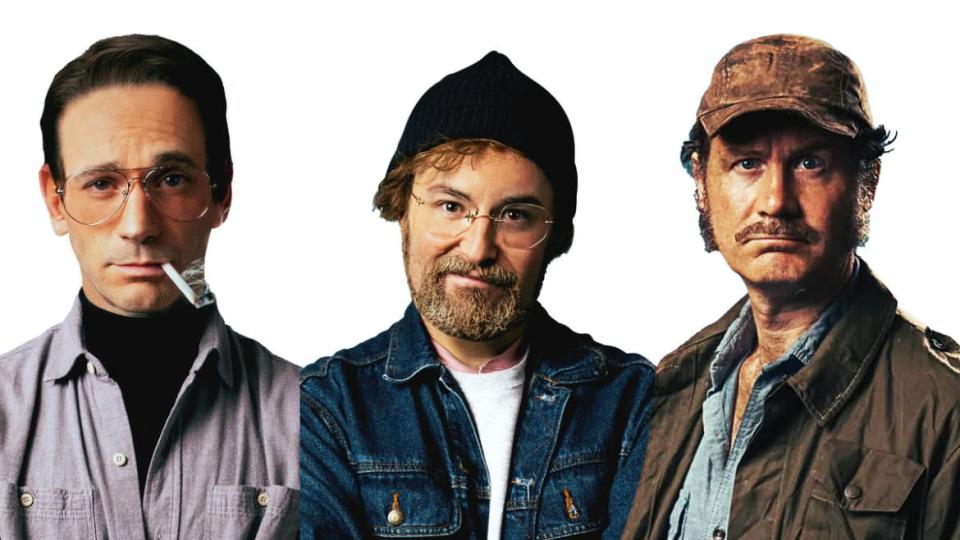
(l to r) Colin Donnell as Roy Scheider, Alex Brightman as Richard Dreyfuss, and Ian Shaw as Robert Shaw in Broadway play "The Shark is Broken."
More collective laughter erupted, as Brightman emphasized that all the fighting and physicality is precisely choreographed—even if he cannot identify the cause of his latest bruise.
Dreyfuss is the only one of the three actors to still be alive. Is that an additional responsibility on Brightman’s shoulders?
“It is an odd responsibility,” he said. “‘Pressure’ is the wrong word, but something to live up to. What I’m trying to do is live up to Richard Dreyfuss then. People evolve. I am trying to look closely at the ’70s version of this person, and to me that person doesn’t exist anymore. In the past I have taken over the playing of other iconic characters. Maybe I was stupid enough not to think about it much. Now I am actively trying to be stupid about it, and forge my own path. If people like it, great; if people don’t like it, great. I hope everyone who had a finger involved in the making of Jaws comes to see the show.”
Gottlieb had been to see the show when it played in Canada, and was “very lovely,” said Shaw. No one knows if Dreyfuss will attend a performance. Shaw believes Steven Spielberg—whose voice we hear as a disembodied presence off stage—is aware of the play, “and I would of course be delighted for him to see it because I have a deep respect for him.”
Brightman said he wasn’t a Jaws fanatic, but is a thriller and horror fanatic, “and I’d have my film card taken away if I claimed to be a horror fanatic and not seen Jaws.” When he signed on to do the show, he rewatched it, and became intrigued by what was happening off-camera before every take. He has taken on a lot of Dreyfuss-isms. “I’m doing one now,” he said, scratching his beard.
“There’s a lot of me in him and him in me,” Brightman said of Dreyfuss. “I think I have a little bit more confidence about where I am in my career, and that I’ve had a healthier go at it with therapy and meds and things like that. But I have the capacity in me as an actor to be a very seventies Dreyfuss. It comes to fruition in that panic attack. I always believe that your baggage should come with you on stage a little bit. So, it’s nice to have that moment, because it does feel like an exorcism every night of whatever’s in there, and it will be different every night. That’s when I feel I do my best work. I feel that Richard Dreyfuss, the one I’m studying in the 70s, has a lot of weird, wrong empathy, like, ‘You feel that, so I feel that more.’ He takes on lot of people’s energy, which is not always healthy but is very emotional. It’s a little too close to me, sometimes. Sometimes.”
“Wearing the Speedo is kind of freeing”
Like Brightman, Donnell wasn’t “a huge Jaws fan,” but since taking the play on, studying the materials, and rewatching the movie, “suddenly I am seeing Jaws fucking everywhere—T-shirts, license plates. I have become much more aware of how pervasive it is in culture, and how much it means to people. It’s such a good film. Getting to reach it through this lens means I am now thinking about it behind the scenes and how it got made in the first place—and what a triumph that ended up being. It sort of blows my mind.”
In the play, his Scheider—just like Chief Brody—is the voice of reason and calm between the warring Shaw and Dreyfuss, trying to talk them both off psychological ledges in the already physically perilous confines of the boat, and for Shaw to ease up on Dreyfuss. And then, the most surprising scene unfolds—newly added to the play since its London run—when, to the pleasurable shock of the audience this writer sat among, the lean and muscular Donnell as Scheider strips to a very tight, little black Speedo to sunbathe on his own. We see him take a moment to himself, ignoring all the radioed calls from crew, just to soak up some rays.
For Donnell, “it’s great” to be able to show another side of the play’s Mr. Responsible—and especially in a scene that the audience audibly responds to. “It’s a tricky balance because you have two really outsized personalities and Roy is not mothering them but he’s ushering things along and he’s the fulcrum between the two of them,” Donnell told The Daily Beast.
“We wanted to show a bit more of Roy, Roy ‘under the hood,’” said Shaw, no euphemisms intended, “and it’s difficult because Roy is such a self-contained character. He keeps his emotions in check because he’s so professional—so we just wanted to see something, and of course it would have to be private.”
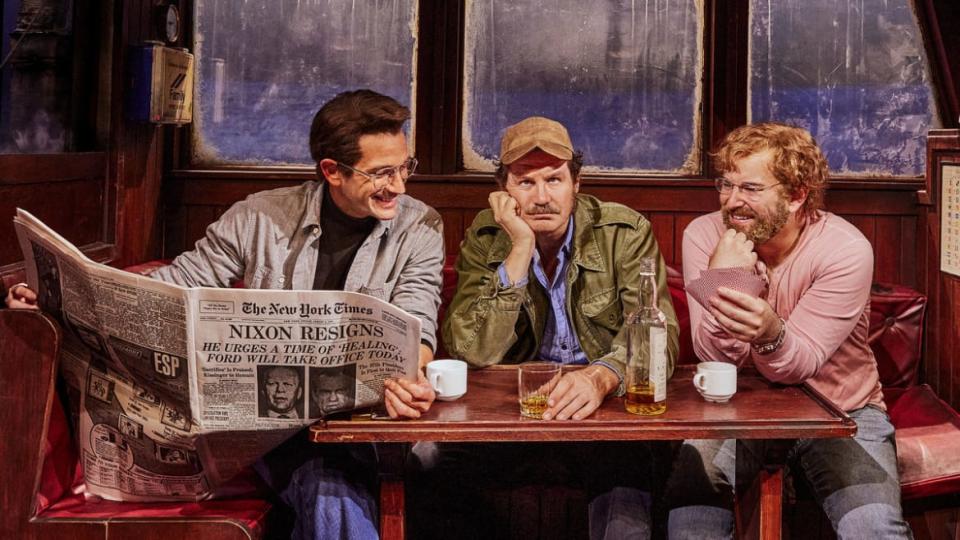
(l to r) Colin Donnell, Ian Shaw, and Alex Brightman in "The Shark Is Broken."
“It’s lovely to have that opportunity to see the cracks in Roy’s armor because he’s such a stable figure throughout rest of the show,” said Donnell. “But I don’t think anybody could have been on that boat without all of those circumstances infecting them in some way. It’s nice to let Roy loose a little bit and really show the other side of him. “There’s a great photo of Richard and Roy behind the scenes. Richard is fully clad in a sweater, jacket and everything. And Roy is standing there in the teeniest little Speedo on the back of the boat.”
“It’s very real for an actor,” Brightman said. “We’ve all worked on a million things, and know that nobody comes out of an artistic process without a scratch, or a bruise here and there. It would be weird if Roy just came out fine. The play shows that everybody is affected—even the outwardly strongest people.”
“For Roy, the question is, how does it eventually come out?” said Donnell. “Is it private, or an outburst with crew, or an outburst at home screaming into the pillow.”
And then there’s the fact Donnell is in a tiny Speedo, center stage, holding the play in his command for considerable minutes.
“To say wearing the Speedo is revealing is sort of redundant,” Donnell said, smiling. “It is kind of freeing. I had a little bit of trepidation going into it of course. Taking off your clothes in front of 850 people eight times a week is a little bit unnerving I think, but as we’ve gone along it has been lovely to hear the response of the audience. There’s been a bit of shock. That is what I want it to be. There’s something lovely about seeing Roy in a happy place where he’s in his element getting to relax in a second, then turn the screws and show the other side of it. In a Speedo of all things! He’s naked essentially, and it’s great because it’s raw and there’s nothing about it that isn’t visceral.”
“We’ve gotten some ‘ooohs’ and catcalls,” Donnell added of the audience response.
“The audience can be lively!” Shaw said, smiling. “Without wanting to get all pretentious, we are trying to look at all the men ‘under the hood.’ So, with Roy there, physically you’re looking at him under his clothes. Him in the Speedo is a sort of visual metaphor for what we’re trying to achieve in the whole play.”
When the play expanded from its 60-minute slot in Edinburgh, Shaw was racking his brains for how to expand Roy’s character. “It was my sister Kath (who had visited their father on the set of Jaws) who said to me that, when Roy had a free moment, he would take off his clothes and sunbathe, and I thought that was funny and interesting. I thought it was brave and eccentric. Robert and Richard would have thought, ‘What the heck’s he doing?’ But just the thought of Roy being confident enough to go, ‘I don’t care, this is what I want to do’ is something I enjoy. He is comfortable in his own skin, whereas the other two aren’t to some degree. They’re both trying desperately to get somewhere, and they can’t.
“It isn’t that Roy doesn’t have stresses and strains—he does—but what I love about him is that it feels to me like he’s done that magnificent thing of receiving trauma and being able to do a martial arts move on it and move forward, whereas Shaw and Dreyfuss are still spinning away from their traumas—Shaw externally and Dreyfuss internally. And that’s why I love these three characters. It feels that we have three very distinct elements.”
The play seems a reverberation of father-son relationships, both in its real-life crafting, and in the eddying relationships of the three men on stage. But Shaw thinks it has a more familial structure—that in traditional terms, Scheider—with his empathy and sympathy—is the maternal character, with Shaw and Dreyfuss as the brutal father and rebellious son, even if Dreyfuss also ends up paternally wanting to save Shaw from himself.
“When I met Richard in the ’90s and introduced myself he was still traumatized by the experience,” Shaw recalled. “But seeing him later and in other interviews, it feels he has come to terms with the whole business. It feels as if he has forgiven Robert, and talks affectionately about him.”
“I have been thinking about Jaws for years”
Away from the documentary and biographical information we see distilled into the show, Shaw has dreamt up moments in The Shark Is Broken that are “fictional but allowable,” like a panic attack Dreyfuss has—extrapolated by Shaw from the actor’s bipolar condition, the extremity of the circumstances of filming, and the panic and stress many actors feel. Robert Shaw helping Dreyfuss in that moment felt “spiritually true” to Shaw.
Shaw knows fans of the movie will especially flock to the production. “I’m a Jaws fan too, so I feel I am sitting with them,” he said, laughing. Nina Dunn’s video design of sea and sky adds an implicitly cinematic sheen.
A final Easter egg within the play for the fans and devotees of the film sees the characters of Scheider, Dreyfuss, and Robert Shaw imagine what the film may mean beyond being a thriller about a very focused serial-killer shark—theories and readings that still occupy fans today. How do Brightman, Donnell, and Shaw see Jaws—what wider meanings or readings do they think can be gleaned from it?
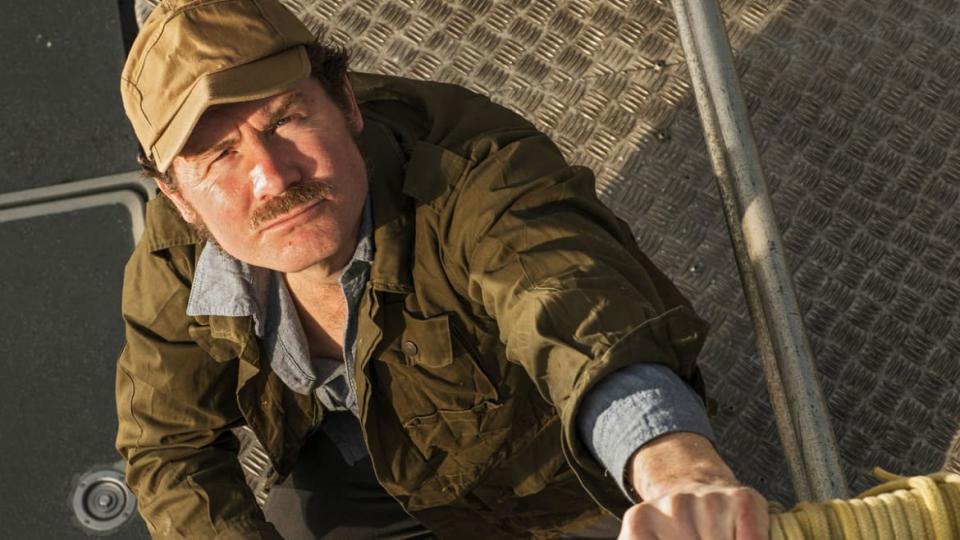
Ian Shaw as Robert Shaw in Broadway show "The Shark is Broken."
“During the play Dreyfuss talks about Harold Pinter’s play, The Dumb Waiter, and there is this similar thing in Jaws of these three guys being stuck on this boat and maybe they’re already dead,” ventured Brightman. “This whole adventure is them coming to terms with something much bigger than themselves—being careful, not careful, measured and not measured. A really out-there person on an amount of psychedelics might say they begin the movie in hell and forge through until they are on the other side.”
“I love that,” said Donnell. Turning to Shaw, he added: “I like the one you’ve written for Roy in the show—that Jaws is about personal responsibility, a microcosm of government versus the people, and the onus on us to take care of our community when the powers that be are looking the other way and not doing right by the community.” (One clever line notes the aesthetic similarity between sleazy town mayor Larry Vaughn, played by Murray Hamilton in the film, and Richard Nixon.)
“I think Roy is the most spot-on,” said Shaw. “Obviously, as Robert Shaw says, it’s about a shark on one level. It’s a very simple adventure story. I do think it does have these elements that intrigue me about 1974 and Vietnam. The touchstone of the Indianapolis speech is Hiroshima, and that’s obviously one of most appalling things that happened in our history. And the sinking of the ship and the shark attacks are almost like a revenge upon those soldiers for dropping off that bomb. So there’s trauma and there’s more trauma, and then Quint intends to inflict more trauma on the shark, and then the shark inflicts more trauma on him. So what I find very beautiful—that’s maybe not the right word, very interesting—is how trauma is perpetuated and handed on.
“We see it constantly when you switch on the news, and the way countries operate almost as individuals. They cannot break free of the father that brutalized them. So,” Shaw sighed, “that bit of poetry sticks with me because its people like Roy who are able to break the cycle and accept that they have received trauma. They don’t have to hand it on. I want to live in a world where people accept bad things, and not feel they need to exert revenge.”
After a brief, freighted silence, Brightman said, “Use that answer,” and there was more laughter.
“Sorry, I only give you that answer because I have been thinking about this for years,” Shaw said. “I wouldn’t normally have been residing so deeply in it, but I have been forced to think about Jaws a bit more deeply than normal people.”
What would Robert Shaw have thought of The Shark Is Broken, his son having not only co-written it, but also starring in it as his dad, off-camera while playing his most legendary movie character?
Ian Shaw smiled. “That’s a quantum physics question for me, because this play wouldn’t exist if my father was alive. It’s a poem about him. He talks about his own father in it, and my own son is going to come to see this on Broadway. So, there’s a sort of line of these boys and men here. And it’s to do with death. So, I mean conceptually, if there is such a thing as the afterlife and if Robert was there, I think he’d be confused. I think he’d be looking through his telescope and going, ‘What the hell are they doing? Why can’t they just get on with something else?’”
And for a final time, the three actors dissolved into merry laughter.
Get the Daily Beast's biggest scoops and scandals delivered right to your inbox. Sign up now.
Stay informed and gain unlimited access to the Daily Beast's unmatched reporting. Subscribe now.

